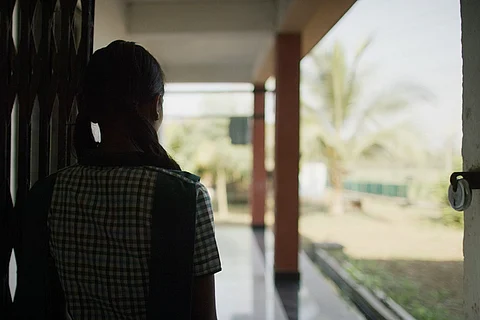

Jasmine Kaur Roy didn’t get asked many questions at the open forum. Amoli, a documentary she made with Avinash Roy, had just been screened at the International Documentary and Short Film Festival of Kerala. The film, which is on the shocking story of the huge number of girls who end up in sex trafficking in India, was made to touch a chord and reach the masses.
Amoli begins with a police raid at a brothel. Someone points to a little trapdoor on the wall. Men are breaking it open. A woman barely squeezes through the door and finds in a narrow little space, three girls tucked in a corner. They refuse to come out. The woman tells them to not be afraid, they are here to rescue the girls. But they keep saying they wouldn’t come.
“They don’t come out because their trust has been broken. They have been brought here by someone they trusted. It could be a relative or a friend or a boyfriend. Now when the police and authorities say, ‘I am there to rescue you’, they just don’t trust them. And they are children. They are probably thinking they’d be taken from one hell hole to another,” says Jasmine.
Avinash Roy, her co-director, could not come to the festival. Both of them, graduates of FTII, have been working in the Development Communication Centre for about a decade, and making films to raise social consciousness on various issues. For that reason, they have chosen to narrate the documentary using celebrity voices.
Amoli came out in seven languages and seven celebrities have narrated each of them. Rajkumar Rao’s Hindi version was screened at the fest. In Tamil, it was Kamal Haasan, in English Vidya Balan. Jisshu Sengupta did the voiceover in Bengali, Puneeth Rajkumar in Kannada, Nani in Telugu and Sahcin Khedekar in Marathi.
“It is a call to action film. The producers wanted a celebrity voiceover so it would have a better impact on the audience. It would be taken to a larger audience. The views on YouTube have crossed 20 million and the comments show that people are really affected by it,” Jasmine says.
(Avinash Roy and Jasmine Kaur Roy)
She too was affected, hearing the statistics, how big the numbers were when she embarked on the project.
“So huge that it is categorised as a business industry. Sale of children for sex is treated as an industry. That shows how humongous the business is.”
In their research, they found out about source, transit and destination areas. Destinations are all big cities like Mumbai, Delhi, Kolkatta, Chennai or Hyderabad. Avinash and Jasmine wanted to go beyond the more known sources in Bengal. They went to the north of Bengal, to the tea gardens. Where they went, every third or fourth house had a missing girl. One of them was Amoli, the title they chose.
“She represents all the girls who go missing. Their stories are common. They’d be lured for a job, taken away and that’s the last you hear of them. Amoli has been gone for five years now. And the person who trafficked her lives close by,” Jasmine says.
The traffickers are often respected people in the villages. They are called placement agents. They give jobs to the girls. They’d be taken away for domestic labour or as help at a shop. Sometimes it is the parents who sell the children, because of abject poverty.
In the film, the girls, shot in dark spaces, talk about being cheated by a mother or a father. About being given hormone injections to look older. Fourteen becomes twenty-eight over days. It was not easy for the filmmakers to get them to open up.
“You have to build trust with them. They are telling their personal stories. It happens over multiple meetings. I was the only other woman there. And we got on camera only those who were willing to talk, without showing their faces.”
It is not that laws are not there, but the traffickers and the perpetrators are able to find loopholes, Jasmine says.
“The age of the girl would be fudged. She might be 15 but on the papers she’d be 18.”
But Jasmine, Avinash and the producers who came with the idea – Culture Machine Private Ltd – are taking the film to places, hoping the authorities will take the cause up, bring stricter laws and save our girls.